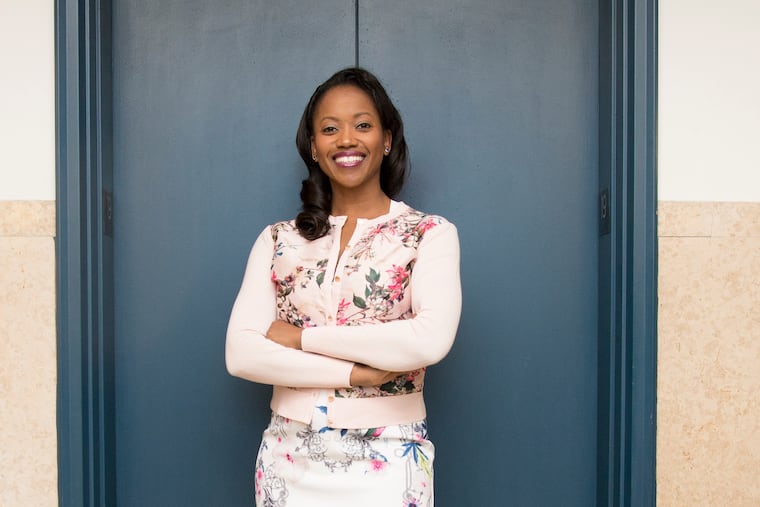‘Living Single’s’ Erika Alexander is honoring her hero, U.S. Rep. John Lewis, as producer of his new bio-doc
The documentary, which will be available to stream on Friday, chronicles Lewis’ sprawling 60-plus-year career of community organizing and legislative activism.

There’s an old saying, “You should never meet your heroes,” because they won’t live up to your expectations. But when actress Erika Alexander met her hero, U.S. Rep. John Lewis, that didn’t happen.
“If anything, he exceeded my expectations,” she said.
Alexander is best known for role as Maxine Shaw on the ’90s sitcom Living Single but got her first major television role as Cousin Pam on The Cosby Show. She’s racked up hundreds of TV and film credits, including roles in Get Out, Queen Sugar, Black Lightning, and Law & Order SVU.
Her latest gig is helping produce John Lewis: Good Trouble, a biographical documentary about the Georgia congressman’s journey to becoming one of the country’s most storied leaders. The documentary, which will be available to stream on Friday, chronicles Lewis’ 60-plus-year career of community organizing and legislative activism. It features interviews with U.S. Reps. Ayanna Pressley (D., Mass.), Alexandria Ocasio-Cortez (D., N.Y.), the late Elijah Cummings (D., Md.), politician Stacey Abrams, and others.
The film was directed by Dawn Porter for Magnolia Pictures, Participant Media, CNN Films, and Alexander’s Color Farm Media.
The Inquirer talked with Alexander about the documentary and why she connects with Lewis.
This interview has been edited and condensed.
How did you become involved with the documentary?
I have a background in campaigning and [political] surrogate work, and in 2016, I had the chance to campaign with Congressman Lewis and Stacey Abrams and Ayanna Pressley in Georgia. It was really a lesson on how to be young, gifted, and Black, and in the South, and in American politics.
I know his constituent services representative, she’s a friend, and she brought me in as a [strategist] for the congressman. Then, my [business] partner Ben Arnon and I were introduced to Dawn Porter, and Dawn Porter happened to be working on a documentary for John Lewis, and we just decided right then and there that we would partner up.
How will this documentary be different from other biographical works on Congressman Lewis?
John Lewis has been in our lives for so long, we think we know him, but I don’t think most people do. He is a young man that decided he wanted to be part of the Civil Rights struggle. He didn’t know then that he was on his way to becoming an American icon, and so Dawn Porter directed the documentary and puts the spotlight on him.
Good Trouble is his show. He’s not next to Martin Luther King Jr. or Bobby Kennedy telling their story.
So we get to learn what it was like growing up as a Black sharecropper. We get to see how he honed his fiery oratory skills by preaching to the chickens. And he tells us about that fateful day on the Edmund Pettus Bridge [in Selma, Ala.] when white policemen stormed that peaceful protest and cracked his skull open, which nearly killed him.
The timing of this documentary seems to coincide with the national unrest and resistance to racism and police brutality.
It’s ironic that it’s the worst time to put out a film [because of coronavirus closures] and the best time for this film. Although we’re talking about staying healthy and being grateful to be alive, we still have to do our work. Here in Los Angeles where I live, the whole town is shut down in terms of production and it’s hard to get anything in theaters, and even if you do, will people show up?
But because Congressman Lewis is so significant, this is a unifying film — a reason for people to come together. There are so many institutions and traditional theatrical outlets that want to innovate new ways to release this film.
How will people be able to see it, with theaters closed?
It will be on multiple streaming platforms. It’ll also be in theaters that are open, like drive-ins. Also, later on, CNN will show it on Sept. 27 on their channel and then it will live on HBO Max indefinitely. But that’s after its theater run.
What’s something you learned about John Lewis that you didn’t know before working on this doc?
He is an art connoisseur and he has very sophisticated tastes. Here we are thinking that if you come from the country, you like simple things, and he does like a simple life. He’s living a life of peace, and if you’re around him, you actually adopt that feeling.
Why do you look up to John Lewis?
Everybody tries to see themselves in their heroes that they fall in love with, and I’m no different. I see a lot of my life’s story in him — that strength of character and wanting to learn. He was an outsider, even inside of his family. He really had a Dickensian background to the first part of his life.
And early in my life, up in the mountains of Arizona, my family was very poor. We weren’t sharecroppers [like Lewis], but we were certainly suffering from the effects of systemic racism.
I got a chance to break out of that when I auditioned for a film in Philadelphia. And at Freedom Theater, [where Alexander had early roles that attracted attention], my life changed. Suddenly I was on a national stage and having to deal with impostor syndrome. So this boy from Troy, Ala., reminded me of the girl from Flagstaff, Ariz.